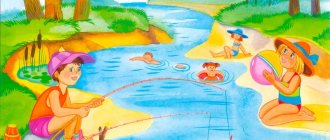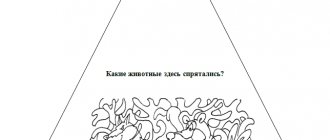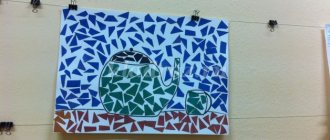Summary of speech therapy lexical and grammatical classes in the preparatory group
Educational field: Communication, Cognition.
Age group: preparatory (6-7 years).
Topic: “Letter to Africa.”
Didactic support (resources): envelope with a letter, whatman paper, easel, markers, ball, portrait of Mubamba, tape recorder, diagram for describing the seasons.
Goal: to consolidate ideas about the signs of the Russian winter.
Software tasks:
1) Continue to teach how to coordinate adjectives with nouns in gender and case; 2) Expand the vocabulary of signs on the topic “Winter”; 3) Develop logical thinking, auditory attention; 4) Cultivate a respectful (tolerant) attitude towards people of other nationalities.
Progress of the lesson:
1. Organizational moment.
- Guys. Look. We have received a letter. Interesting. Who is it from? The envelope says: “Africa. Mubamba." Do you know who Mubamba is? I do not know either. Now we’ll see what’s in the letter... (opens the envelope, skims the letter)
- Yeah, everything is clear... Guys, Mubamba is a boy. He lives in Africa. Now I will read his letter to you. But he knows Russian very poorly, so there are many mistakes in his writing. These errors need to be corrected. So if you notice a mistake, raise your hand immediately!
2. Agreement of adjectives with nouns in gender and case.
"Hello guys! My name is Mubamba. I live in distant Africa. In Africa we have all seasons: summer, autumn, winter, and spring. But the weather is always the same - very hot. And there is never white snow. And I heard that Russian winter is a very beautiful time of year. I ask you very much: tell me about Russian winter: what the earth, sky, trees look like in winter, what birds, animals, people do. I hope your letter will be very long and interesting. I wish you good health. Goodbye. Mubamba." Look, he even put his photo in the envelope!
The speech therapist shows a portrait. The boy's appearance is briefly discussed - his skin color, hair structure, facial features, assumptions are made about how old he is, whether he is poor or rich, what he likes to do. Emphasize that, despite the fact that he does not look like us, he is still an attractive boy, with an intelligent look, a kind smile, etc.
3. Set the mood to control your speech.
Guys, we need to fulfill his request. Let us tell Mubamba what Russian winter is. We will record our story on a tape recorder. You just need to make beautiful, detailed sentences. In addition, we will depict each sign of winter on a sheet of paper, Tatyana Borisovna, an art teacher, will help us with this. We will send this drawing along with the cassette to Africa, and I think Mubamba will be very pleased.
Before we tape record, I remind you of our main rule:
Whoever wants to talk must pronounce everything correctly and clearly, so that Mubamba can understand it! Repeat!
The children say the rule in chorus.
4. Analysis of the scheme for describing the time of year.
This diagram will help us when writing a letter:
Or this one:
Let's remember what each symbol means?
5. Writing a letter.
- So, where does any letter begin? That's right, with greetings and introductory words.
Children speak freely. The most interesting and beautiful proposals are recorded on a tape recorder. Each child says a separate phrase. At the same time, Tatyana Borisovna makes the corresponding sketches on a sheet of paper on an easel. The approximate text of the general story is given below.
“Hello, Mubamba! We have received your letter. We fulfill your request. Winter is a wonderful time of year! Snow covered earth. It is white, creaky, fluffy and cold. The sun shines, but does not warm, because it is close to the horizon. It's cold and frosty outside. In cloudy weather, a cold wind blows, and the blizzard sings songs. There are snowdrifts. The river is covered with thick ice. Many birds fly away to warmer regions, but bullfinches, tits, and sparrows remain. People put on warm hats, fur coats, and felt boots. Children ski, sled, and skate. In winter we celebrate Christmas, New Year...” (etc.)
After completing the story, the audio recording is listened to. Children analyze the coherence of the resulting letter, its understandability, originality, their own sound pronunciation, and the expressiveness of speech.
1 child is selected, who, together with Tatyana Borisovna, puts the cassette in the cassette box, folds the drawing in four, seals everything in a large envelope, fills in the address
6. Development of logical thinking, activation of vocabulary.
While the envelope is being sealed, let's play the game “Name the Opposite” with the ball:
- In winter, the night is long, and what a day... (short) - The snow is soft, but the asphalt is... (hard) - In winter, the wind is cold, northern, and in summer, what a breeze... (warm, southern) - In summer, the hare has a dark coat, but in winter, what ... (light) - When there is a snowstorm or blizzard outside, the children are in a sad mood, and when the sun is shining, what a mood... (cheerful) - In the fall, the ice on the river is thin, and in the winter... (thick) - Skating, skiing is good, but breaking snow buildings is like... (bad) - He who rides from a high mountain is brave, and he who is afraid is what... (cowardly) - Mubamba eats sour lemon in Africa, and what kind of ice cream... (sweet) - In summer for birds there is a lot of food, but in winter... (not enough) - Whoever eats snow and icicles is often sick, and whoever hardens himself and goes in for sports is what... (healthy) - Santa Claus gives gifts not old, but what... (new) - " Christmas tree, light up!” we shout not quietly, but like... (loudly) - The ski track is narrow, but the hill is... (wide) - In our village the tree is low, but in Khabarovsk it is... (high)
7. Completion of the lesson.
So our drawing and a cassette with a story about winter are sealed in an envelope. Address filled in. I'm sure Mubamba will receive your letter soon. Do you think he will be satisfied? I went to take the letter to the post office. Goodbye.
| Zakharova Oksana Vladimirovna, teacher-speech therapist, village of Chegdomyn, Khabarovsk Territory |
- Summary of a lesson on the formation of the lexical and grammatical structure of speech [Who lives where?] in a preparatory group for school
- Summary of a speech therapy lesson in the preparatory group “The Magic Land of Soundland”
- Summary of an open speech therapy lesson in the senior group “How Pinocchio looked for friends”
- Summary of the frontal lesson in the preparatory school group “Preposition IZ-ZA”
- Summary of the lesson in the preparatory speech therapy group “Sound and letter Shch”
( 4 liked, average score: 5.00 out of 5)
Loading...





